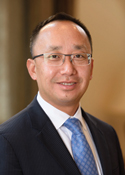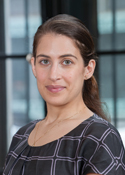Integrative Oncology
Bridging the Gap between Ancient Healing and Modern Medicine
by Shelly Latte-Naor, MD, and Jun J. Mao, MD, MSCE
Claire was diagnosed with breast cancer while in her early 50s. In the months following her diagnosis, she underwent surgery, radiation therapy, and chemotherapy. While battling the physical, psychological, and social side effects of her treatment, she diligently followed her doctor’s instructions and her nurse’s advice. She asked questions at every appointment and stayed informed through various online patient resources. However, during the course of her treatment and in the months that followed, she found herself increasingly faced with questions that did not seem to have easy answers.
While Claire and her oncologist were content with the successful completion of her cancer treatment, Claire was left with many physical side effects that, while hardly as dangerous to her health as the cancer was, still significantly affected her ability to return to her normal life. Since beginning treatment, she had faced persistent fatigue and was still unable to sleep through the night. She also found herself worrying about the future, dreading the thought of a potential cancer recurrence.
She questioned her lifestyle and every detail of her diet, fearful of not doing “the right thing” to stay healthy. When looking for answers and relief, she became overwhelmed with well-intentioned advice from friends and family, who were constantly sending her information about natural supplements and alternative treatment options. While Claire was curious about ancient healing practices, she didn’t want to embark on a quest of trial and error to find something that helped. She wished she had someone to guide her as she explored these complementary and alternative treatments.
Integrative medicine provides supportive care that goes hand-in-hand with conventional cancer care. There is no promise of a cure, rather a focus on widening the angle of what “care” means in the cancer setting.
Claire’s story is shared by many cancer survivors who eventually find their way to integrative medicine. They come at all stages of their treatment looking for tools to address the symptoms of their cancer, help managing the side effects of their treatment, and advise on how to reduce their risk of cancer recurrence. Many are looking for someone to help them navigate the plethora of supplements, diets, and health regimens that seduce with promises of a “natural” cure.
The field of integrative oncology, while still young, has entered the mainstream of cancer care and is represented at most National Cancer Institute-designated cancer centers. One of the aims of this field of medicine is to clearly delineate the distinction between alternative therapies and integrative or complementary therapies. One clear distinguishing factor is that integrative medicine provides supportive care that goes hand-in-hand with conventional cancer care. There is no promise of a cure, rather a focus on widening the angle of what “care” means in the cancer setting. This includes aspects of health that are rarely addressed in our highly specialized medical system, such as cancer-related fatigue, fear of recurrence, and the psychological impact of stress. The recommendations of integrative oncology specialists are based on the best available scientific evidence, and we put safety first.
Alternative medicine, on the other hand, often rejects conventional care and lures people with promises of an easy and natural way to cure cancer. Very often, these promises are not based on sound scientific findings, but on ominous, unexamined theories and a variety of miraculous-sounding anecdotes that spark tremendous hope in anyone who hears about them.
Meanwhile, integrative medicine centers, like our service at Memorial Sloan Kettering Cancer Center in New York, NY, are busy researching traditional healing methods, as well as natural products, for their potential role in cancer care. Through ongoing studies, we are examining the role of acupuncture in the treatment of chemotherapy-induced neuropathy and of insomnia, two very common problems for cancer survivors. We are also comparing strenuous yoga with restorative yoga to pinpoint which aspects of these practices offer the greatest benefits for cancer survivors.
There is increasing evidence to support the use of complementary treatments for a variety of cancer related symptoms and side effects – treatments that can help people like Claire. For example, the Journal of Clinical Oncology recently published a study demonstrating that a six-week mindfulness meditation class decreased fear of recurrence, as well as fatigue, in breast cancer survivors. Similarly, mindfulness-based cancer recovery, a psycho-social intervention using principles of mindfulness, has been found to have a long-lasting beneficial effect on the psychological well-being of breast cancer survivors. Additionally, in women with breast cancer, acupuncture was found to alleviate symptoms, such as joint pain and hot flashes, specifically related to the use of hormone treatment.
Complementary therapies may provide relief at every stage of treatment across the cancer spectrum. People undergoing active chemotherapy can benefit from acupuncture for reducing nausea and vomiting. When facing or recovering from a surgical procedure, massage therapy can alleviate pain and anxiety related to surgery. A recently published study shows that prostate cancer survivors who experienced insomnia during their radiation treatment found relief in the ancient meditative martial arts form Tai Chi.
Integrative oncology specialists can help you supplement your cancer treatment or recovery with safe, non-invasive complementary treatments. They can help you vet the abundance of health-related information you encounter and work with you to come up with a treatment plan that aligns with your health philosophy while also following your oncologist’s regimen. In short, integrative oncology effectively bridges ancient, traditional healing methods and state-of-the-art cancer treatments, ensuring that cancer survivors are able to benefit from the best of both worlds.

Dr. Jun James Mao is chief of the Integrative Medicine Service, as well as the Laurance S. Rockefeller Chair in Integrative Medicine, at Memorial Sloan Kettering Cancer Center in New York, NY. He is also president of the Society for Integrative Oncology. Trained as both a family physician and an acupuncturist, Dr. Mao combines Western and Eastern approaches to cancer pain management.

Dr. Shelly Latte-Naor is an integrative medicine physician at Memorial Sloan Kettering. She specializes in mind-body medicine for stress management and resilience building.
This article was published in Coping® with Cancer magazine, January/February 2017.


